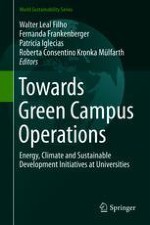2018 | OriginalPaper | Buchkapitel
School of Public Health, University of Sao Paulo—Marching Towards Socioeconomic and Environmental Sustainability
verfasst von : Ana Maria Maniero Moreira, Wanda M. Risso Günther, Helena Ribeiro
Erschienen in: Towards Green Campus Operations
Aktivieren Sie unsere intelligente Suche, um passende Fachinhalte oder Patente zu finden.
Wählen Sie Textabschnitte aus um mit Künstlicher Intelligenz passenden Patente zu finden. powered by
Markieren Sie Textabschnitte, um KI-gestützt weitere passende Inhalte zu finden. powered by
